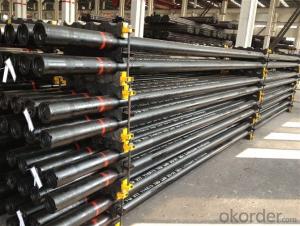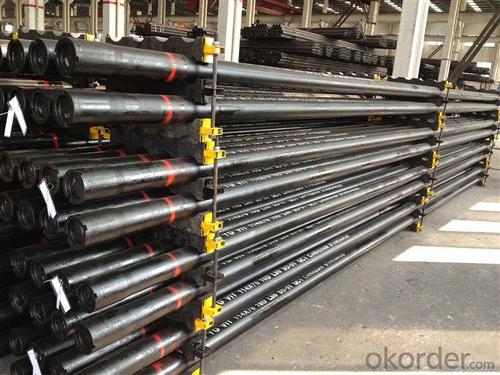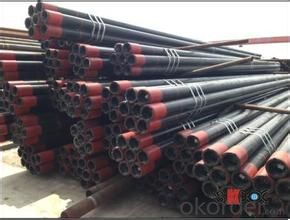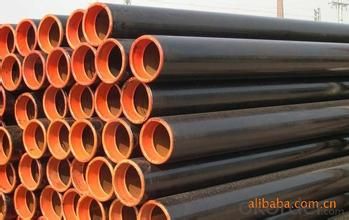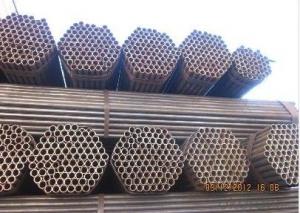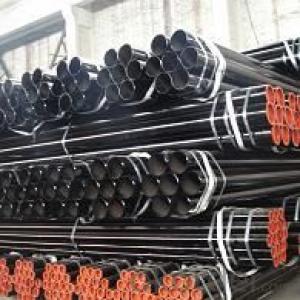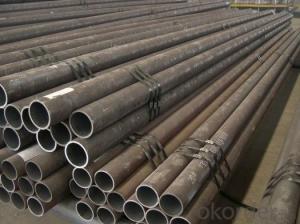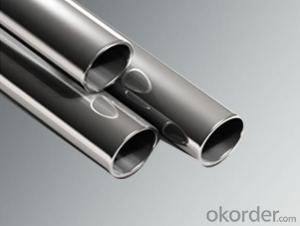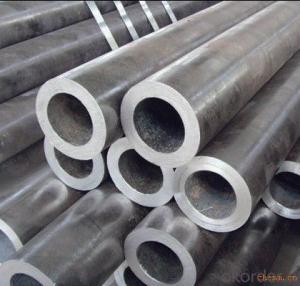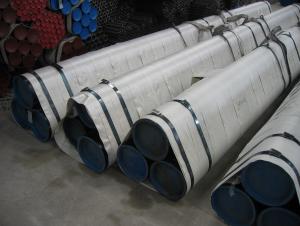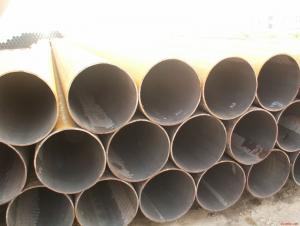Seamless Carbon Hot Rolled Steel Casing Pipe
- Loading Port:
- China Main Port
- Payment Terms:
- TT or LC
- Min Order Qty:
- -
- Supply Capability:
- -
OKorder Service Pledge
OKorder Financial Service
You Might Also Like
API 5CT oil casing and tubing
1.Detail Specification:
1) Grade:H-40,J-55,K-55,N-80,C-75,L-80,C-90,C-95,P-110,Q-125
2) Size: 4 1/2", 5", 5 1/2", 6 5/8", 7", 7 5/8", 9 5/8", 10 3/4", 13 3/8", 16", 18 5/8", 20"
3) Wall thickness: 5.11 - 16.13 mm
4) Clasp Type : STC, LTC, BTC
5) Length : R1,R2,R3
6) Products comply with API SPEC 5CT standards, and use for API 5CT emblem
2.Round thread casing coupling size quality and tolerance:
Code | Specification | Diameter W /mm | Min Length | Boring diameter /mm | Width of bearing surferingb/mm | Weight | ||
Diameter D /mm | Short coupling Nl | Coupling length Nl | short couping | Coupling length | ||||
4-1/2 | 114.30 | 127.00 | 158.75 | 177.80 | 116.68 | 3.97 | 3.62 | 4.15 |
5 | 127.00 | 141.30 | 165.10 | 196.85 | 129.38 | 4.76 | 4.66 | 5.75 |
5-1/2 | 139.70 | 153.67 | 171.45 | 203.20 | 142.08 | 3.18 | 5.23 | 6.42 |
6-5/8 | 168.26 | 187.71 | 184.15 | 222.25 | 170.66 | 6.35 | 9.12 | 11.34 |
7 | 177.80 | 194.46 | 184.15 | 228.60 | 180.18 | 4.76 | 8.39 | 10.83 |
7-5/8 | 193.70 | 215.90 | 190.50 | 234.95 | 197.64 | 5.56 | 12.30 | 15.63 |
8-5/8 | 219.08 | 244.48 | 196.85 | 254.00 | 223.04 | 6.35 | 16.23 | 21.67 |
9-5/8 | 244.48 | 269.88 | 196.85 | 266.70 | 248.44 | 6.35 | 18.03 | 25.45 |
10-3/4 | 273.05 | 298.45 | 203.20 | --- | 277.02 | 6.35 | 20.78 | --- |
11-3/4 | 298.45 | 323.85 | 203.20 | --- | 302.42 | 6.35 | 22.64 | --- |
13-3/8 | 339.72 | 365.12 | 203.20 | --- | 343.69 | 5.56 | 25.66 | --- |
3. FAQ of Seamless Casing Pipe:
①How is the quality of your products?
Our products are manufactured strictly according to national and internaional standard, and we take a test on every pipe before delivered out. If you want see our quality certifications and all kinds of testing report, please just ask us for it.
Guaranteed: If products’ quality don’t accord to discription as we give or the promise before you place order, we promise 100% refund.
②How about price?
Yes, we are factory and be able to give you lowest price below market one, and we have a policy that “ for saving time and absolutely honest business attitude, we quote as lowest as possible for any customer, and discount can be given according to quantity”,if you like bargain and factory price is not low enough as you think, just don’t waste your time.Please trust the quotation we would give you, it is professional one.
③Why should you chose us?
Chose happens because of quality, then price, We can give you both.Additionally, we can also offer professional products inquiry, products knowledge train(for agents), smooth goods delivery, exellent customer solution proposals.Our service formula: good quality+good price+good service=customer’s trust
SGS test is available, customer inspection before shipping is welcome, third party inspection is no problem.
Any question, pls feel free to contact us !
6、Seamless Casing Pipe Images:
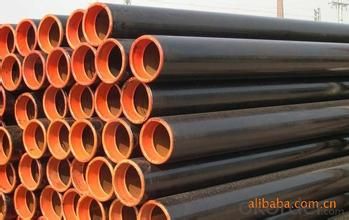
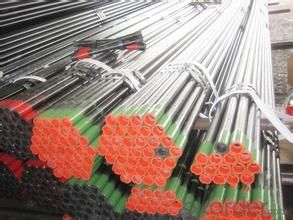
- Q: How are steel pipes used in the construction of dams and water reservoirs?
- Steel pipes find widespread application in the construction of dams and water reservoirs owing to their remarkable durability, strength, and capacity to endure heavy loads and high pressure. These pipes serve multiple indispensable functions within the realm of dam and reservoir construction. A primary utility of steel pipes in these structures lies in their capacity to transport water. They are employed to convey water from its source, such as a river or stream, to the reservoir or dam. These pipes are engineered to withstand the elevated water pressure, ensuring a consistent flow of water to the reservoir. The durability of steel pipes enables them to remain intact even in the harshest environmental conditions. In addition to water conveyance, steel pipes are also utilized for drainage purposes. They are employed to establish drainage systems that help regulate the water level within the reservoir or dam. These pipes are strategically positioned to control the water flow and prevent potential flooding or overflow. Steel pipes are also integrated into the construction of spillways and outlets in dams and reservoirs. Spillways are designed to release excess water from the reservoir during heavy rainfall or when the water level exceeds predetermined thresholds. Steel pipes are employed in crafting these spillways to provide a controlled pathway for water discharge, thus averting any harm to the dam or surrounding areas. Moreover, steel pipes are employed in the construction of penstocks, which are large conduits that transport water from the reservoir to turbines in hydropower plants. The pressure generated by the water within these pipes propels the turbines, facilitating electricity generation. The robustness and durability of steel pipes are vital in ensuring the smooth and efficient operation of hydropower plants. All in all, steel pipes occupy an indispensable role in the construction of dams and water reservoirs. Their durability, strength, and ability to withstand high pressure render them an ideal choice for various aspects of these structures, including water transportation, drainage systems, spillways, and penstocks.
- Q: How does the price of steel pipes vary based on size and grade?
- The price of steel pipes can vary based on their size and grade. Generally, larger pipes tend to have higher prices due to the increased amount of raw materials required for their production. Additionally, pipes with higher-grade steel, which offers better strength and durability, often come at a higher cost compared to lower-grade options. The size and grade of steel pipes are important factors to consider when determining their price in the market.
- Q: Can steel pipes be used for geothermal energy systems?
- Yes, steel pipes can be used for geothermal energy systems. Steel pipes are commonly used in geothermal installations due to their durability, strength, and resistance to corrosion. They can efficiently transport geothermal fluids, such as hot water or steam, from the geothermal source to the surface for energy extraction or for heating and cooling applications.
- Q: What are the safety considerations when working with steel pipes?
- There are several crucial safety considerations to bear in mind when working with steel pipes. To begin with, it is imperative to wear the appropriate personal protective equipment (PPE). This includes safety glasses or goggles to shield the eyes from debris or sparks, gloves to protect the hands from sharp edges or hot surfaces, and steel-toed boots to safeguard the feet from falling objects or heavy equipment. Additionally, it is advisable to wear a hard hat to shield the head from potential falling objects or hazards overhead. Moreover, one must be mindful of the weight and size of the steel pipes. Handling heavy pipes can strain the back and muscles, so it is essential to utilize proper lifting techniques and seek assistance when necessary. The use of lifting equipment, such as cranes or forklifts, can also help prevent injuries associated with heavy lifting. Another safety consideration is the risk of cuts or punctures. Steel pipes may have sharp edges or burrs, so it is important to handle them with care and wear suitable gloves to minimize the risk of injury. It is also recommended to inspect pipes for any defects or sharp edges before working with them. Furthermore, working with steel pipes may involve welding or cutting, which can generate sparks, heat, and fumes. It is vital to work in a well-ventilated area or employ proper ventilation equipment to ensure the elimination of harmful gases or fumes. Fire safety precautions, such as having fire extinguishers nearby and adhering to proper procedures for hot work, should also be taken. Lastly, one must be aware of potential hazards associated with working at heights or in confined spaces. When working on elevated platforms or scaffolding, fall protection measures, like safety harnesses or guardrails, should be in place. In confined spaces, proper ventilation and monitoring for hazardous gases are essential to prevent asphyxiation or exposure to toxic substances. By adhering to these safety considerations and following proper procedures, the risk of accidents or injuries when working with steel pipes can be significantly reduced.
- Q: What are the factors that affect the lifespan of steel pipes in different environments?
- The factors that affect the lifespan of steel pipes in different environments include exposure to corrosive substances, temperature fluctuations, water quality, and mechanical stress.
- Q: Can steel pipes be painted or coated?
- Yes, steel pipes can be painted or coated. Painting or coating steel pipes helps to protect them from corrosion, rust, and other environmental factors. It also enhances their aesthetic appearance and can be used to indicate the type of pipe or its function.
- Q: Difference and application of seamless hot rolled pipe and cold drawn pipe in seamless steel tube
- The general production of hot-rolled seamless steel pipe in the automatic tube rolling mill. Solid billet after inspection and clearance of surface defects, cut into required length, in the tube hole end surface of centering, then sent to a heating furnace, in punch in punch. While continuing to rotate and advance, in the roll and immediate action, tube gradually form a cavity, called capillary. Sent to the automatic tube rolling mill on rolling. Finally after all the entire thickness, sizing machine sizing, achieve specifications. Using continuous pipe mill production of hot-rolled seamless steel tube is advanced.1.2, in order to obtain smaller size and better quality of seamless tube, cold rolling, cold drawing must be used or combined method of cold rolling. Usually in two roller mill, rolling ring groove tapered plug pipe in variable cross section circular slot and the composition. Drawing is usually in single or double 0.100T chain drawbench.1.3, the extrusion method will soon heat the tube blank in the closed extrusion cylinder, the perforation bar and extrusion rod movement, so that extrusion parts from the smaller die hole extrusion. This method can produce smaller diameter steel pipe
- Q: Are steel pipes suitable for underground mining applications?
- Yes, steel pipes are suitable for underground mining applications. Steel pipes have been widely used in the mining industry for various purposes such as water supply, ventilation, and conveyance of materials. The strength and durability of steel pipes make them suitable for the harsh and demanding conditions of underground mining. Steel pipes are known for their high tensile strength, which allows them to withstand the pressure and stress exerted by the surrounding rock and earth in underground mining operations. They can handle heavy loads, making them suitable for transporting materials and supporting structures in mining tunnels. Additionally, steel pipes are resistant to corrosion, which is crucial in underground mining where moisture and various chemicals are present. Their corrosion resistance ensures the longevity and reliability of the pipes, reducing the need for frequent replacements and maintenance. Furthermore, steel pipes can be easily welded and joined, allowing for customization and flexibility in designing underground mining systems. They can be adapted to various shapes and sizes to meet specific mining requirements. In conclusion, steel pipes are highly suitable for underground mining applications due to their strength, durability, corrosion resistance, and versatility. They have been proven to be effective in supporting mining operations and ensuring the safety and efficiency of underground mining processes.
- Q: What does "buried steel pipe" 6*2SC100 mean?
- This is the electrical drawings, such as water supply and drainage, HVAC is that DN, SC is the laying of electrical wiring, which is defined as threading pipe laying. 100 is the nominal diameter of the pipe, unit millimeters.
- Q: Can steel pipes be used for conveying liquids and gases?
- Indeed, the utilization of steel pipes extends to the conveyance of both liquids and gases. These pipes find widespread application across a multitude of industries, including oil and gas, water supply, plumbing, and industrial processes. Their commendable attributes encompass robustness, longevity, and resistance to corrosion. Consequently, steel pipes possess the capacity to withstand elevated pressure and temperature, rendering them ideal for the transportation of an extensive array of liquids and gases such as water, oil, natural gas, steam, and chemicals. Furthermore, the convenience of welding or threading steel pipes together facilitates effortless installation and maintenance procedures.
Send your message to us
Seamless Carbon Hot Rolled Steel Casing Pipe
- Loading Port:
- China Main Port
- Payment Terms:
- TT or LC
- Min Order Qty:
- -
- Supply Capability:
- -
OKorder Service Pledge
OKorder Financial Service
Similar products
Hot products
Hot Searches
Related keywords
